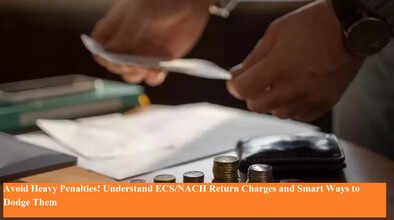Avoid Heavy Penalties! Understand ECS/NACH Return Charges and Smart Ways to Dodge Them

In today's fast-paced digital economy, auto-debit transactions have become a convenient method to manage recurring payments. However, failed transactions under ECS or NACH systems can attract significant penalties. Let’s explore what ECS/NACH return charges are, how they affect you, and most importantly—how you can avoid them.
💡 What Are ECS and NACH Return Charges?
The Electronic Clearing Service (ECS) and the National Automated Clearing House (NACH) are automated payment systems designed to handle recurring payments like EMIs, SIPs, utility bills, and insurance premiums. These systems automatically deduct the due amount from your bank account on scheduled dates.
However, if the auto-debit fails due to insufficient balance, incorrect bank details, or technical issues, a penalty—known as the ECS/NACH return charge—is imposed by the bank. This fee varies depending on your bank and the number of failed transactions.
📊 How Much Are the Penalties?
ECS/NACH return charges are not uniform across banks and can escalate with repeated failures. Here’s how different banks levy these charges:
-
Axis Bank: ₹500 for the first failure, ₹550 for subsequent ones.
-
Federal Bank (Savings Account): ₹250 for the first return, ₹500 thereafter.
-
Federal Bank (OD/CC Accounts): ₹350 for the first return, ₹750 for later instances.
-
State Bank of India (SBI) and Bank of India: ₹250 per failed transaction (including GST).
It’s important to note that if multiple auto-debits fail within a single month, penalties can accumulate quickly. For instance, four SIPs of ₹500 each failing in a month can result in a total penalty exceeding ₹2,300 after GST and fees.
⏰ When Are Return Charges Applied?
Banks impose ECS/NACH return charges in the following scenarios:
-
Your account has insufficient funds at the time of the debit.
-
Incorrect or outdated bank details are provided.
-
Technical issues at the bank's end interrupt the transaction.
Once deducted, these charges cannot be refunded, even if the transaction was unintentionally failed.
⚠️ Frequent Failures Can Be Costly
The financial impact increases with every repeated failure. While the penalty may seem minor initially, repeated offenses can hurt your finances significantly. Additionally, frequent failures can damage your credit history and create trust issues with financial institutions.
✅ How to Avoid ECS/NACH Return Charges
Avoiding penalties is simpler than you think. Here are some effective strategies:
-
Maintain a sufficient balance in your account at least a day before the scheduled auto-debit date.
-
Track your payment schedule regularly so you're always aware of upcoming transactions.
-
Update your bank details immediately if there are any changes in your account number, IFSC code, or contact details.
-
Enable SMS and app notifications to receive reminders for upcoming ECS/NACH debits.
Being proactive can save you from unnecessary charges and help maintain a good financial record.
🧾 Final Thoughts
As the digital payments ecosystem continues to expand, understanding the finer details of systems like ECS and NACH is essential. Awareness and timely action can shield you from avoidable penalties. So, if you rely on auto-debit for your bills and investments, keep your account active, updated, and well-funded.
By staying informed and organized, you can keep your finances smooth—and your penalties at zero.

